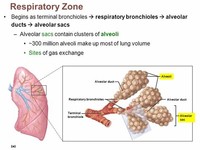Facts about Alveoli

The alveoli are part of the remarkable harmony between the body and the environment, interfacing between the atmosphere and the circulatory system.

The alveoli have an innate tendency to collapse (atelectasis) because of their spherical shape, small size, and surface tension due to water vapor.

The alveoli consist of an epithelial layer and extracellular matrix surrounded by capillaries.

The alveolar sacs are made up of millions of tiny, exceptionally thin-walled air sacs called alveoli.

The human lung contains about 480 million alveoli (Weibel 2008), representing a total surface area of about 70-90 square meters (m2).

The alveolar sacs, which connect to the bronchioles via alveolar ducts, are in the form of clusters of alveoli, with each of the alveoli resembling individual grapes within a bunch.

The walls of the alveoli are but one-cell thick and each alveolus is tightly wrapped in blood vessels (capillaries).

